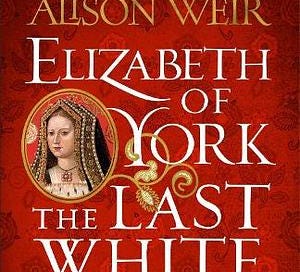Elizabeth of York: The Last White Rose - Alison Weir (Book Review)
The eldest child of King Edward, Elizabeth of York’s life is full of up and downs. The civil war between the House of York and the House of Lancaster. The Usurper King Richard III locking up her brothers in The Tower, never to be heard from again. Married to King Henry VII, Elizabeth witnesses several plots against her husband’s claim to the throne. Elizabeth is also the first Tudor Queen and should have been the first Queen of England to rule in her own right.
Written by Alison Weir, Elizabeth of York: The Last White Rose is historical fiction. Weir has published many historical novels based on her work as a historical biographer. In her author’s note, Weir mentions that she did take small liberties (such as changing the date someone entered into service of Elizabeth), but overwhelming the historical novels she publishes are based in research.
While I do prefer political history of the 20th century, I did do some Early Modern Europe history both at university and at high school. I knew vaguely of the War of the Roses (admittedly, I still don’t know a lot about it) and the Princes in the Tower. But a lot of my knowledge of the English monarchy does rest on the shoulders of King Henry VIII, his six wives, and his daughters (Sorry Ed, but you’re not important compared to your sisters) as well as the Tudor-Stewart change with King James VI of Scotland/I of England. So The Last White Rose was a very interesting read as Elizabeth’s story unfolds in a time period that I know little about.
The story is split into four parts - Princess, Bastard, Queen, and Matriarch - which focus on parts of Elizabeth’s story. The first part explores Elizabeth’s youth, the second the period where Elizabeth’s parents’ marriage is deemed illegitimate and thus all their children bastards and undeserving of royal titles by Richard III in order to secure his throne but Elizabeth is still in the midst of political movings, the third the period where Richard III is defeated by Henry VII leading to the marriage between Elizabeth and Henry for Henry to properly secure the throne, and finally as a mother who sees her eldest son raised in Ludow to prepare for being King, the loss of several children, and the marriages Henry arranges for the children. The Last White Rose could have read just fine without the titled parts, but by splitting and naming each part, there is added value. I really like the emphasis that each part had. While life typically does not have strictly defined times, the emphasis makes sense to key milestones within Elizabeth’s lifetime.
Weir does an amazing job of blending novelization with historical research. I felt like I learnt a lot about such a key figure even though there was little academic reading involved. I look forward to reading more of Weir’s books, including her non-fiction books.





